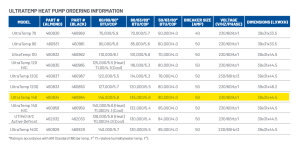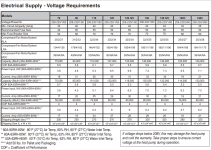- Jun 7, 2019
- 56
- Pool Size
- 11000
- Surface
- Plaster
- Chlorine
- Salt Water Generator
- SWG Type
- CircuPool RJ-30 Plus
Recently bought a house in the Vero Beach, Florida area. Pool is approx. 11,000 gallons, in-ground. We're not here most of the summer when a heater is unnecessary. Running in the pool helps my wife's arthritis so we'd like to extend the usable season as long as possible.
The pool would be heated continuously (or at least for the duration of the usable season, whatever that turns out to be), it wouldn't be fired up just on weekends, etc. Would like to maintain the water temp in the mid-80's for most of the winter, although it wouldn't be a big deal if we had to shut it off for a month or two if we get a cold snap (below 70 ).
).
We don't have natural gas and I really don't want to go to the trouble and expense of burying a propane tank, so I think a HP is the only viable option.
I was looking at the Raypak Crosswind 65-I. 61,000 BTUs. Next biggest unit I could find is a 90,000 BTU Hayward, about $1,000 more. I know this is a long-term investment and don't want to end up getting something underpowered, but I don't want to waste money on capacity I don't really need.
Would greatly appreciate any advice, especially from someone in this general area or similar climate. It can go down into the 50's or occasionally the 40's but even if it does it generally doesn't last more than a few weeks. Most of the time it's at least in the mid 70's.
Thanks!
The pool would be heated continuously (or at least for the duration of the usable season, whatever that turns out to be), it wouldn't be fired up just on weekends, etc. Would like to maintain the water temp in the mid-80's for most of the winter, although it wouldn't be a big deal if we had to shut it off for a month or two if we get a cold snap (below 70
We don't have natural gas and I really don't want to go to the trouble and expense of burying a propane tank, so I think a HP is the only viable option.
I was looking at the Raypak Crosswind 65-I. 61,000 BTUs. Next biggest unit I could find is a 90,000 BTU Hayward, about $1,000 more. I know this is a long-term investment and don't want to end up getting something underpowered, but I don't want to waste money on capacity I don't really need.
Would greatly appreciate any advice, especially from someone in this general area or similar climate. It can go down into the 50's or occasionally the 40's but even if it does it generally doesn't last more than a few weeks. Most of the time it's at least in the mid 70's.
Thanks!



